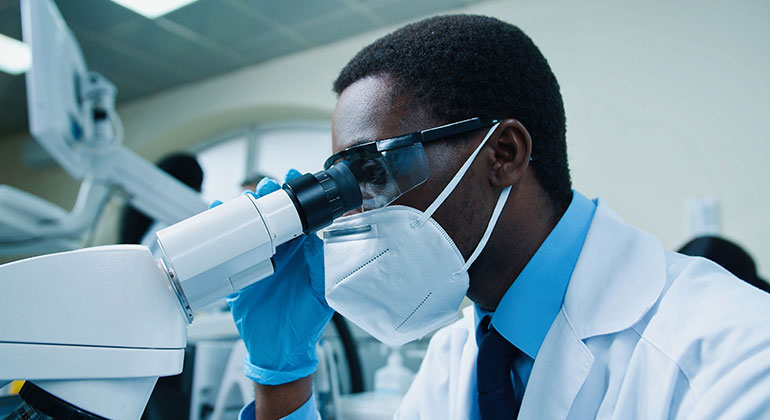Mount Sinai Researchers Discover How Early-Stage Breast Cancer Can Become a Silent Killer in Some Patients
Study finds potential diagnostic biomarkers for patients who could be at risk

Mount Sinai researchers have discovered a previously unknown mechanism in which not-yet-malignant cells from early breast cancer tumors travel to other organs and, eventually, “turn on” and become metastatic breast cancer.
The researchers, who reported in Cancer Research in April, also showed the ability of the transcription factor NR2F1, a protein that controls a gene’s outward expression, to block the pre-malignant cells from ever disseminating, which could be a crucial diagnostic tool to predict relapse.
“The current challenge for the management of treatment of early-stage breast cancer patients (for instance, patients who have non-invasive lesions such as ductal carcinoma in situ), is that even though local invasive recurrences are reduced after surgery or surgery with radiation, the risk of dying from breast cancer remains the same,” said the study’s lead author Maria Soledad Sosa, PhD, Assistant Professor of Pharmacological Sciences, and Oncological Sciences, at The Tisch Cancer Institute at Mount Sinai. “This suggests that before detection and removal of the invasive tumor mass, some pre-malignant cells disseminated and lodged at other sites, waiting for later reactivation. The identification of an ‘early dissemination signature’ in the breast tissue that could identify patients at risk of developing later relapses, who are therefore candidates for systemic therapy, is crucial to reduce mortality in these patients.”
A small but significant percentage of women with early-stage breast cancer never progress into an invasive breast tumor, which is the expected course of metastatic breast cancer. Instead, they die after their pre-malignant lesion reoccurs only in other organs, essentially becoming an unexpected, silent killer. Until this study, the mechanism by which pre-malignant cancer cells acquire mobile and invasive features that allow dissemination and colonization in other organs was not clearly understood.
Researchers used animal models and pre-malignant breast cancer cells from patients, 3D cultures, and high-resolution microscopy to investigate how these pre-malignant cells disseminate. The authors found that the pre-malignant cells downregulated the levels of NR2F1, which helped prompt dissemination along with the upregulation of PRRX1, a master regulator of invasive phenotype.
The authors were able to find pre-malignant cells that simultaneously expressed low levels of NR2F1 and high levels of PRRX1 in patients’ ductal carcinoma in situ tissues, making them a specific pre-malignant subpopulation with potential to disseminate. The clinical significance of this inverse ratio between NR2F1 and PRRX1 needs to be determined within a larger number of human samples and with follow-up studies on overall survival and metastasis-free survival.
Funding for this research included a Susan G. Komen Breast Cancer Foundation Career Catalyst Research Grant and a Breast Cancer Alliance Young Investigator Grant.
About the Mount Sinai Health System
Mount Sinai Health System is one of the largest academic medical systems in the New York metro area, employing 48,000 people across its hospitals and more than 400 outpatient practices, as well as more than 600 research and clinical labs, a school of nursing, and a leading school of medicine and graduate education. Mount Sinai advances health for all people, everywhere, by taking on the most complex health care challenges of our time—discovering and applying new scientific learning and knowledge; developing safer, more effective treatments; educating the next generation of medical leaders and innovators; and supporting local communities by delivering high-quality care to all who need it.
Through the integration of its hospitals, labs, and schools, Mount Sinai offers comprehensive health care solutions from birth through geriatrics, leveraging innovative approaches such as artificial intelligence and informatics while keeping patients’ medical and emotional needs at the center of all treatment. The Health System includes approximately 9,000 primary and specialty care physicians and 11 free-standing joint-venture centers throughout the five boroughs of New York City, Westchester, Long Island, and Florida. Hospitals within the System are consistently ranked by Newsweek’s® “The World’s Best Smart Hospitals, Best in State Hospitals, World Best Hospitals and Best Specialty Hospitals” and by U.S. News & World Report's® “Best Hospitals” and “Best Children’s Hospitals.” The Mount Sinai Hospital is on the U.S. News & World Report® “Best Hospitals” Honor Roll for 2024-2025.
For more information, visit https://www.mountsinai.org or find Mount Sinai on Facebook, Twitter and YouTube.

Mount Sinai Researchers Discover Why Some Colon Cancers Resist Treatment
Feb 12, 2025 View All Press Releases
Mount Sinai Researchers Create AI Tool to Democratize Access to Cancer Immunotherapy
Jan 06, 2025 View All Press Releases
Scientists Create Most Powerful, Accurate Tool Yet to Research Deadliest Blood Cancer
Apr 18, 2023 View All Press Releases
Scientists Discover Gene Mutation That Signals Aggressive Melanoma
Apr 06, 2022 View All Press Releases
Molecular Treatment Is Able to Control Brain Metastasis of Different Tumors
Feb 11, 2022 View All Press Releases
Mount Sinai’s Dubin Breast Center Annual Benefit Raises Over $2.5 Million
Feb 08, 2022 View All Press Releases
